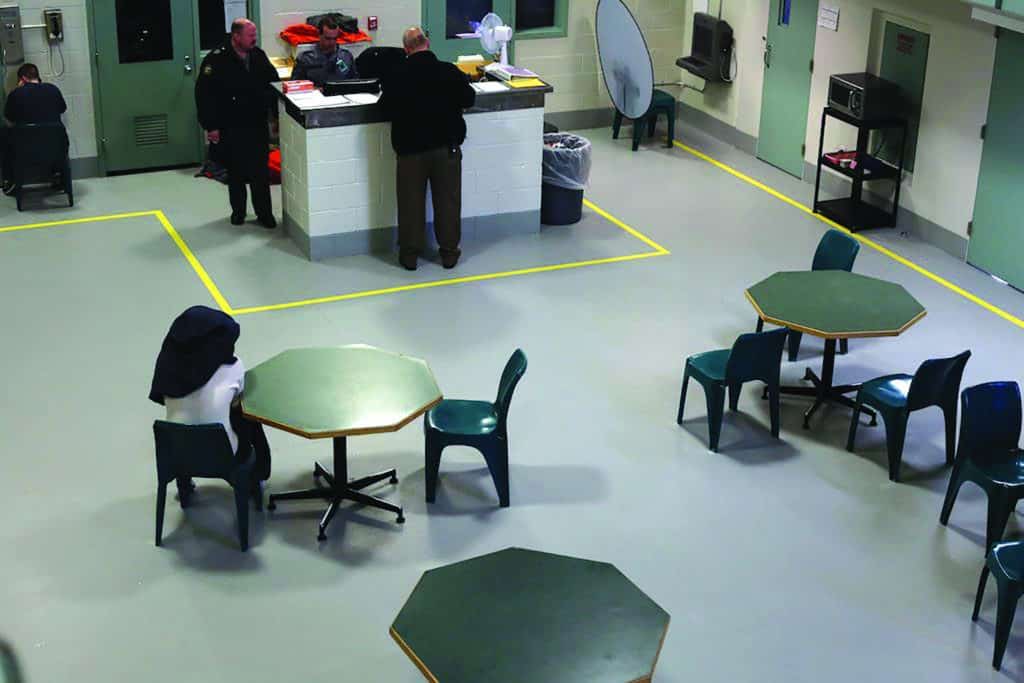
By Alan J. Keays/VTDigger
A group of state officials are recommending a change in policy that allows prisoners to get out from behind bars earlier apply to inmates who were sentenced before the new law took effect.
However, whether that recommendation makes it past a legislative rules committee remains unclear.
A bill passed and signed into law earlier this year established guidelines for instituting a “good time” program, which allows prisoners to earn time off of their sentences by obeying rules and meeting certain requirements.
The legislation was passed as a way to help reduce the overall inmate population in Vermont as well as to encourage good behavior among those serving time behind bars.
The law called on the state Department of Corrections to file a rule by July 1, 2020, to implement the program. The legislation, Act 56, also called for the creation of a committee to prepare a proposal for who would eligible for the good program — specifically whether to include offenders sentenced before the effective date of the program.
In a report released earlier this month, the panel recommended that the program should be available to inmates who were sentenced before the program took effect.
Among those serving on the panel were officials from the corrections department, as well as Chris Fenno, executive director of the Vermont Center for Crime Victims Service, Brian Grearson, chief superior court judge, James Pepper of the Department of State’s Attorneys and Sheriffs, Assistant Attorney General David Scherr, and Emily Tredeau of the defender general’s prisoners’ rights office.
According to the report, allowing increased participation in the good time program would have “greater impact on morale and behavior” of prisoners.
“If many people were left ineligible for the program, the effect on the facility environment is diminished,” the report stated.
“It will also create disparity and confusion among the incarcerated population,” the report added. “The recommendation takes into consideration the potential for increased lawsuits if the program is not applied to previously sentence persons.”
Vermont previously had an earned good time program for prisoners, but lawmakers did away with it in 2005.
According to corrections officials, about 45 states have some sort of system in place for awarding good time to prisoners. In different states, the programs can allow inmates to reduce their sentences by between 15% and 50%.
Currently, only Vermont prisoners who take part in the corrections department’s work camp program are eligible for “day for day” credit. For example, if a prisoner serves one day in work camp, that inmate gets credit for two days served.
That work camp program is only available for certain offenders not convicted of a “listed” offense, which are those considered the most serious crimes, such as sex assaults, robbery, and convictions involving the death of another person.
The legislation allows offenders to earn five days a month off their sentence, provided they are not found to have violated a major disciplinary rule and they meet “merit-based” milestones designed to prepare them for reentry into the community.
An inmate can also earn 30 days off a sentence for an act of “heroism,” such as protecting the life or safety of another person or performing an act of heroism during an emergency.
The good time program would not be available to prisoners serving sentences of life without parole.
In its report, the panel flagged the impact of the program on crime victims as a “primary concern,” and recommended that “all associated parties” should work together to notify victims about the good time program.
“The recommendation comes with a full understanding that developing an on-going plan to communicate with victims is critical,” the report stated.
Lawmakers passed the legislation to again implement a good time program as Vermont officials are attempting to curb the state’s prison population.
Vermont currently has about 1,741 prisoners, including about 270 inmates who are housed out-of-state due to a lack of prison facilities in this state.
Those out-of-state prisoners are held Tutwiler, Mississippi, in a facility owned by CoreCivic, a company that operates private prisons across the country.
Sen. Joe Benning, R-Caledonia, a member of the Senate Judiciary Committee and the Legislative Committee on Administrative Rules, said he’s open to considering the suggestion to expand eligibility for the program. LCAR will likely be the next body to take up the recommendation.
“Initially I’m open to all ideas that could potentially relieve the pressure on our prison systems,” Benning said Friday. “There may be individuals who fall into this particular category I would rather not see released.”
He added that details of how the expansion would be implemented are important factors. “Unless and until you get into the particulars of how the rule would be developed it probably would be premature to try and comment.”
Sen. Dick Sears, D-Bennington and chair of the Senate Judiciary Committee, said while he supports including previously sentenced prisoners as part of the change, he isn’t sure if the rules committee will take that step.
“You’re changing sentences. I’m not sure you can do that,” Sears said. “I know that the defense bar certainly wants it, but some of the state’s attorneys and other prosecutors think it’s not a good idea to change sentence.”
He added, “I think it’s a valuable tool for the corrections department as long as it’s earned good time and not automatic.”




